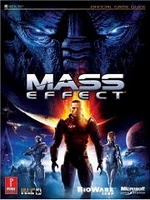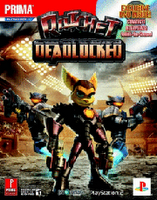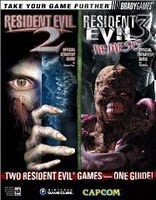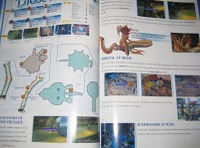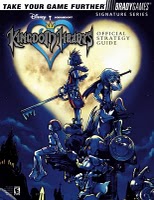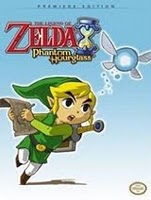 I am very pleased to announce that I have had the pleasure of interviewing strategy guide writer Stephen Stratton. I have wanted to interview him since my review of the Phantom Hourglass guide, because not only did I find the guide to be most helpful, but also because his writing made me chuckle, particularly when Link found new weapons. He has been in the industry for quite some time, and anyone who is into Zelda *coughcoughlikemecoughcough* will recognize his name on most of the Zelda guides.
I am very pleased to announce that I have had the pleasure of interviewing strategy guide writer Stephen Stratton. I have wanted to interview him since my review of the Phantom Hourglass guide, because not only did I find the guide to be most helpful, but also because his writing made me chuckle, particularly when Link found new weapons. He has been in the industry for quite some time, and anyone who is into Zelda *coughcoughlikemecoughcough* will recognize his name on most of the Zelda guides.
But without further ado, the interview with Stephen Stratton.
1. Which strategy guide company do you write for, or are you a freelancer?
I’m a contracted author for Prima Games, and I’ve written guides for Prima for the past 8 years.
2. How did you get into guide writing?
My brother Bryan and I both got in the same way: through a mutual friend and longtime Prima author named David Hodgson, whom we both worked with at a now-defunct videogame magazine/website called Incite.com. About a year after Incite went under, we started working for Prima, having been recommended to them by David. He’s a helluva guy. 🙂
3. What elements do you like to personally ensure go into a guide?
Every guide I write begins with a helpful introductory chapter that sets the tone for the guide and explains how to use the book. Next comes a thorough training chapter that touches on all the key elements of gameplay, teaching the nuances of the game’s mechanics and providing a wide range of tips on how to play with skill. The walkthrough usually comes next, which needs to be well organized and thorough, providing fast answers without getting bogged down in too much narrative (something I’ve had to work on). I like to conclude my guides with several pages of quick-reference checklists at the back for those who just like fast answers. In short, I try to make each guide as versatile and informative as possible, so that the reader can quickly find the information they seek no matter how they choose to reference it.
4. What do you think separates a great guide from a horrible one?
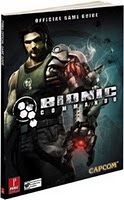 Great guides are very difficult to produce these days, requiring incredible effort from all parties involved. This includes the author(s), the designer(s), the project manager(s), and even the game’s developers, whom we guide makers must often rely upon to get the job done by deadline. But no matter how much or how little support the author gets, there is no excuse for writing a horrible guide – that’s always avoidable. No matter how challenging a project might be, a solid and valuable guide can always be produced if the author takes the time and puts in the effort required. Awful guides that offer little helpful information or have no clear organization to them are the either result of an amateur, or pure laziness.
Great guides are very difficult to produce these days, requiring incredible effort from all parties involved. This includes the author(s), the designer(s), the project manager(s), and even the game’s developers, whom we guide makers must often rely upon to get the job done by deadline. But no matter how much or how little support the author gets, there is no excuse for writing a horrible guide – that’s always avoidable. No matter how challenging a project might be, a solid and valuable guide can always be produced if the author takes the time and puts in the effort required. Awful guides that offer little helpful information or have no clear organization to them are the either result of an amateur, or pure laziness.
5. When you first start on a guide project, what are some prewriting steps you like to take in addition to playing the game?
The moment I’m told what my next project will be, I immediately begin researching the game online, then begin outlining what my guide needs to contain, and how to best present it all. I brainstorm as much as possible before the game arrives, because deadlines are often very strict. While playing the game, I’m constantly taking notes in Excel format, jotting down each character, enemy, skill, spell, item, enemy, collectible, and so on as I encounter them. I’ve found that taking copious notes slows down the gameplay phase of the project, but it helps me quickly find information during the writing phase, which is invaluable to me in keeping a rhythm going. Also, I usually end up turning these tables of notes into the checklists that appear at the back of the book. So it’s almost like I’m using the checklists myself while writing the guide.
6. Can you take us through the general process of what it takes to develop and publish a guide?
In short: lots of work! From an author’s perspective, you have to play the game, master it fully, outline a cohesive guide and then write, write, write. Time is always short, so it’s the author’s job to keep everybody else working – the faster I turn in text, the faster it can be copyedited, laid out, and then sent off to the game’s publisher for approval. Corrections invariably come back to us authors, which we implement before the guide can be sent off to print. So it’s sort of like an assembly line that begins and ends with the author.
7. How much time in advance do you prefer to have a game before the final guide deadline? How much time do you actually receive?
 It depends on the size of the game and the support provided, along with the state of the game in the months leading up to its release. A short, straightforward action game with no multiplayer aspect can be handled comfortably in about 2-3 weeks from my end, assuming the game is near final when I get it. For a larger game, like an RPG or sandbox action/adventure, I prefer at least 4-6 weeks. More time to work on a book is always welcome, as it allows me to go into greater detail in the guide. But the reality of deadlines is that they’re often very restrictive. For example, alongside fellow Prima author David Knight, I wrote my most recent Zelda guide (Spirit Tracks) in just 3 weeks, from my first day with the game to my last day of writing!
It depends on the size of the game and the support provided, along with the state of the game in the months leading up to its release. A short, straightforward action game with no multiplayer aspect can be handled comfortably in about 2-3 weeks from my end, assuming the game is near final when I get it. For a larger game, like an RPG or sandbox action/adventure, I prefer at least 4-6 weeks. More time to work on a book is always welcome, as it allows me to go into greater detail in the guide. But the reality of deadlines is that they’re often very restrictive. For example, alongside fellow Prima author David Knight, I wrote my most recent Zelda guide (Spirit Tracks) in just 3 weeks, from my first day with the game to my last day of writing!
8. What is your biggest pet peeve when writing a guide?
Corrections, for sure. There’s nothing worse than having a boatload of nitpicky corrections come back at you at the tail end of an exhausting project! It’s something you learn to live with, though.
9. What do you like most about guide writing?
There’s so much to like about this job, but if I had to pick the single best thing, I’d say it’s the awesome people I get to meet and interact with. This is a very unusual job in a very unique industry, so I end up meeting all sorts of interesting and creative folks. I’ve traveled to Nintendo of America countless times, but I always get a chill walking into that place for the first time on a new project. Other perks include getting to play games before they come out, working from home most of the time, and seeing my guides in stores. That’s just too cool for words!
10. Has guide writing affected how you view video games? In what way?
Not really, I still love games, and I’m certain that I always will. But it has affected how I play them. After years of writing guides, it’s become something that I can’t just turn off. I catch myself searching every little nook and cranny of every level to find all the hidden goodies. Then I slap myself and start actually playing the game for fun again!
11. What is your favorite genre of game to play and what is your favorite to write about?
I can get into any type of game as long as it’s well made and inventive. But in my free time, I tend to seek out unusual games, probably because most games that I write about are pretty mainstream. My favorite guides to write are RPGs, strategy games, and action/advetures, because to me, these genres seem to warrant guides a bit more than others.
12. You have an incredibly extensive strategy guide bibliography. Of all the guides you have written, which one is your favorite?
It’s a five-way tie between all five of the Zelda books I’ve worked on. Zelda has always been one of my favorite franchises and every one of those projects was a labor of love.
13. Now which one do you think is the best?
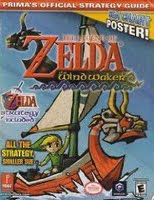 Chaotic: The Official Players’ Guide. Just kidding! I think that my best guide, in terms of how well the whole thing came together, would have to be The Legend of Zelda: The Wind Waker. I’m pretty sure that I invented the whole idea of a “tour” chapter in that guide, which effectively allows you to reference the book in a whole different way outside of the step-by-step walkthrough. If that idea had appeared in previous guides by other authors, I’d never seen it before! Add to that a beautiful layout by Jody Seltzer, guide designer extraordinaire, and you have my best guide to date.
Chaotic: The Official Players’ Guide. Just kidding! I think that my best guide, in terms of how well the whole thing came together, would have to be The Legend of Zelda: The Wind Waker. I’m pretty sure that I invented the whole idea of a “tour” chapter in that guide, which effectively allows you to reference the book in a whole different way outside of the step-by-step walkthrough. If that idea had appeared in previous guides by other authors, I’d never seen it before! Add to that a beautiful layout by Jody Seltzer, guide designer extraordinaire, and you have my best guide to date.
14. Do you have any advice for writers/gamers who would like to break into guide writing?
I sort of fell into this gig, so I’m not really sure how one goes about getting a job like this without knowing somebody in the industry. My brother earned a degree in English, which eventually led to his landing a job as a writer at Incite.com, which in turn became my way into the biz. Did I mention how much I like my brother? 🙂
I can say that this is an extremely challenging job, particularly if you’re not skilled at writing or lack the self-discipline it takes to sit yourself down and work steadily for 12 hours a day, week after week. The job actually breaks down to about 25% playing games and 75% writing, coordinating, correcting, and persevering. It took me a long time to feel confident in my writing, having never gone to college for that purpose. So it’s a tough job for the average gamer to master, but it can be incredibly rewarding if you have a passion for it.
15. Now for the hard question. What is your favorite video game of all time?
That’s a tough one, all right! There are just so many ways to judge games, and I’ve enjoyed so many over the years. But the game that first had the greatest impact on me was the original Legend of Zelda, as it opened my eyes to the fact that games really could take you to a world of pure creativity, discovery, and adventure, and do so in a way unlike any other medium in the world.
16. Do you have anything currently in the works that you can discuss?
I’m actually on vacation right now, having satisfied my contractual commitment for the year with Spirit Tracks. I’m not sure what my next book will be in early 2010, but I’m already looking forward to it. I hope it’s met with rave reviews! 🙂
Oh yeah, no pressure on me, right? Hee. Thanks so much for your time, Stephen! I look forward to all of your future projects, whether they involve Zelda or not.

